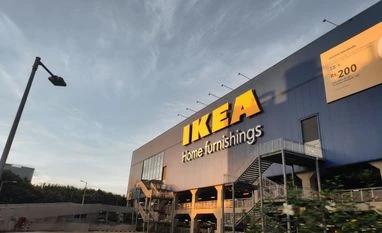Ikea’s India operations reported a modest 5 per cent growth in revenue, reaching Rs 1,852 crore in financial year 2023-24 (between August 1, 2023 and September 30, 2024), marking the slowest expansion since the Swedish furniture giant opened its first store in the country in 2018. The company’s net loss widened by 15 per cent to Rs 1,303 crore due to significant investments in infrastructure and store expansion, according to a report by The Economic Times.
The cumulative losses in India now total Rs 5,550 crore, driven by expenditures on three large-format stores in Hyderabad, Mumbai, and Bengaluru, a smaller store in Mumbai, and the development of supply chains and distribution centres.
Despite economic challenges and restrained consumer spending, Ikea reduced the prices of several products by 20 per cent, aided by lower raw material costs. The retailer aims to expand its footprint in the National Capital Region (NCR) with planned stores in Gurugram and Noida, part of its Rs 10,500-crore investment proposal approved over a decade ago to establish 25 stores by 2025.
Global revenue drops 5 per cent
Globally, Ikea faced a 5.3 per cent decline in revenue, recording 45.1 billion euros in FY24, citing lower prices as the primary factor. In FY23 it recorded 47.6 billion euros. However, the company expanded its retail operations with 56 new outlets in various markets, including Colombia.
Ikea CEO Jesper Brodin expressed optimism about India’s economic potential and reiterated the importance of scaling operations in the country, stating that achieving economies of scale would require establishing 8-10 stores.
Home furnishing industry facing slowdowns
In October, Ingka Group, the owner of most Ikea stores worldwide, reported total sales of 39.6 billion euros for its financial year ending on August 31, 2024. The figure reflected a challenging year for the retailer, as the global economy and home furnishing industry faced simultaneous slowdowns not seen since the 2008 financial crisis.
Also Read
“In all our markets, we experienced an economic deceleration and a corresponding decline in the home furnishing sector,” said Jesper Brodin, CEO of Ingka Group, as quoted by Reuters. “This level of impact is unprecedented since 2008.”
Affordable pricing drives Ikea’s growth
The slowdown led to a dip in store visits and product sales, prompting Ikea to implement substantial price reductions. According to Brodin, the move boosted footfall and increased the volume of products sold. Ingka Group invested over 2.1 billion euros in price cuts across its global markets, helping the retailer maintain its share of the worldwide home furnishing market at 5.7 per cent.
Ingka Group, however, noted that Ikea also benefited from a shift in consumer behaviour during this period. With a global property market slowdown denting confidence, many households opted for more affordable options, which worked to Ikea’s advantage.
Looking ahead, Ikea’s ongoing investments in price adjustments and its focus on affordability are expected to play a crucial role in sustaining growth during uncertain economic times.
)